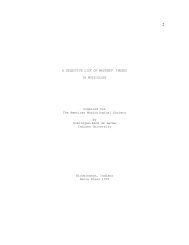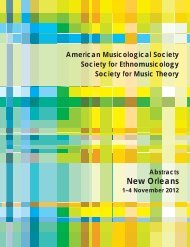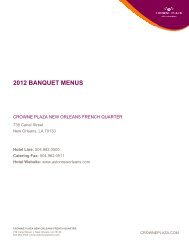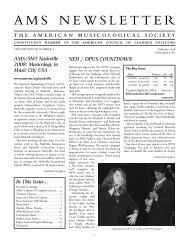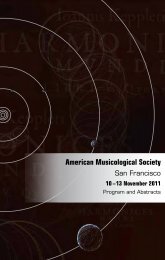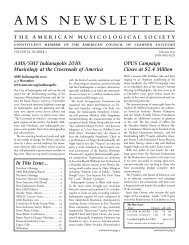AMS Philadelphia 2009 Abstracts - American Musicological Society
AMS Philadelphia 2009 Abstracts - American Musicological Society
AMS Philadelphia 2009 Abstracts - American Musicological Society
Create successful ePaper yourself
Turn your PDF publications into a flip-book with our unique Google optimized e-Paper software.
146 saturday afternoon <strong>AMS</strong> <strong>Philadelphia</strong> <strong>2009</strong><br />
And these convictions heavily shaped editorial choices in their many antiphonaries and graduals.<br />
Above all, we can observe in their transcriptions a concerted effort to avoid the use of<br />
raised leading tones, melodic periodicity, triadic contours and other markers that might suggest<br />
the insidious contamination of tonalité moderne.<br />
We find much the same philosophy guiding the jurist Edmond de Coussemaker in his<br />
transcriptions of fourteenth-century polyphony drawn from the recently uncovered Montpellier<br />
Codex. Coussemaker was reluctant to impose musica ficta with anything but the lightest<br />
touch lest it corrupt the modal delicacy of this music through an over-saturation of appellative<br />
leading tones. Still, it was telling that the Montpellier manuscript also included several<br />
trouvère melodies and secular pieces that Coussemaker acknowledged as unimpeachable harbingers<br />
of the tonal spirit.<br />
iMAginAry lAnDscAPes<br />
richard leppert, university of Minnesota, chair<br />
IMAGINING THE LISTENER THROUGH AMERICAN<br />
EXPERIMENTAL MUSIC: NPR’S rAdioViSioNS<br />
Louise Chernosky<br />
Columbia University<br />
In the 1980s, National Public Radio (NPR) supported experimental music through programming<br />
that both consolidated a tradition and commissioned new works. radioVisions,<br />
broadcast nationally, was the first major series on NPR designed to introduce listeners to<br />
new music. (radioVisions was produced by Steve Rathe, Real Art Ways and NPR member<br />
stations WGBH-FM/Boston in association with NPR, Connecticut Public Radio, and NPR<br />
member stations WFCR-FM/Amherst and WNYC-FM/New York.) It presented an impressive<br />
pageant of music by over fifty <strong>American</strong> composers, including Laurie Anderson, Leonard<br />
Bernstein, Anthony Braxton, John Cage, Aaron Copland, Ornette Coleman, Henry Cowell,<br />
Peter Gordon, Lou Harrison, Joan La Barbara, Conlon Nancarrow, Steve Reich, and Virgil<br />
Thomson. Composer/conductor Gunther Schuller acted as host for each of the fourteen,<br />
hour-long programs, and helped listeners draw connections between broadcasts. radioVisions<br />
was celebrated in the New york times as “the first important broadcast vehicle to focus on new<br />
music—new <strong>American</strong> music, specifically.” The show defined “new <strong>American</strong> music” primarily<br />
as “<strong>American</strong> experimental music.”<br />
This paper examines the <strong>American</strong> experimentalism of radioVisions within the context of<br />
the relationship between public radio and its listeners. I concentrate first on the construction<br />
of experimentalism that can be heard in radioVisions. Through its didactic introductory<br />
segments, composers’ self-portraits, and the show’s rejection of “academic” composers, the<br />
series characterized experimental music as non-European, innovative, eclectic, populist, and<br />
Cageian. Yet this characterization did not always hold sway: an expanded notion of experimentalism<br />
could be heard in radioVisions’s coverage of musical activities in Cincinnati and<br />
Pittsburgh (cities typically ignored in favor of New York’s downtown); its presentation of<br />
more accessible, traditional orchestral music; and its feature on experimental “jazz and creative<br />
music.” I demonstrate how radioVisions’s experimentalism was related to a discursive<br />
construction of public radio listeners. This is most evident in a broadcast called “The Chal-



